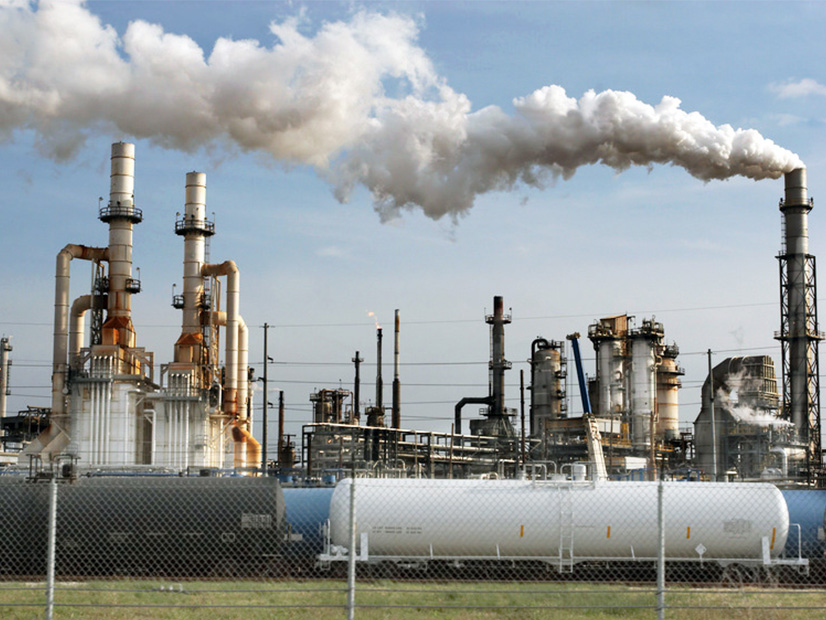
Washington's cap-and-trade bill would set a declining cap on carbon emissions from the state's largest industrial polluters.
| Washington Department of EcologyWashington officials have begun the nuts-and-bolts rulemaking on three major climate change bills the state’s legislature passed in April.
The three new laws include the nation’s second cap-and-trade bill, a low-carbon fuel standard bill and a bill to cut refrigerant greenhouse gases.
State agency officials briefed the Senate’s Environment, Energy and Technology Committee Tuesday on the rulemaking schedules for those new laws.
The new cap-and-invest law (SB 5126) goes into effect on Jan. 1, 2023. Washington has joined California as the nation’s only states with comprehensive cap-and-trade programs. (See Wash. Becomes 2nd State to Adopt Cap-and-trade.) California participates in the Western Climate Initiative cap-and-trade pact with Quebec.
SB 5126 calls for state officials to engage in brainstorming efforts to create a system to set an annual cap on total industrial carbon emissions, a cap that slowly decreases through the years. Large emitters would submit quarterly bids to the state in an auction for greenhouse gas emissions allowances. Companies would be allowed to buy, sell and trade those allowances.
On Tuesday, officials said the greenhouse gas standards have been recently proposed internally at the state’s Department of Ecology, which will manage the program. The agency is expected to review and adopt those standards by February 2022.
Ecology officials are expected to propose a basic framework for the cap-and-invest program next spring, with final regulations to be reviewed and adopted by October 2022.
Specific regulations to safeguard industries with significant foreign competition are expected to be proposed internally in December, with that proposal to be reviewed and adopted by July 2022.
LCFS, Refrigerants Rules
The legislature last spring also passed a low-carbon fuel standard bill, which goes into effect on Jan. 1, 2023. (See LCFS Bill Passes Washington Legislature.)
The bill requires that carbon emissions from gasoline and diesel fuel sold in Washington be cut by 10% below 2017 levels by 2028 and by 20% by 2035. It excludes emissions from fuel that is exported out of state or used by water vessels and railroad locomotives.
Under the program, biofuels would likely be blended with petroleum-based fuels. State officials say vehicle emissions account for 45% of Washington’s carbon pollution.
On Tuesday, state officials told the committee that informal public comments are being accepted, with listening sessions set for Jan. 27 and Feb 23, 2022. The Ecology Department will line up an internal proposal on protective regulations by summer 2022 with regulations formally adopted by winter 2022.
Also on Tuesday, the Senate committee learned that the Ecology Department will accept public input through February 2023 on rules covering hydrofluorocarbon (HFC) emissions from air conditioners and large refrigeration units.
HB 1050 calls for reducing the climate impact of refrigerants used in air conditioners by roughly 70% and in commercial refrigeration systems by about 90%. HFCs account for roughly 4% — or 4 million tons — of Washington’s GHG emissions. The bill is modeled on regulations recently approved by the California Air Resources Board.
The bill enables the state government to set the maximum global warming potential (GWP) measurements for the gases within all sizes of refrigeration units. It would also require grocery stores, ice rinks and other owners of large refrigeration units to periodically check for HFC leaks. Maximum GWP is a measure of an HFC’s ability to retain heat in the atmosphere compared to a similar volume of carbon dioxide over a 100-year period.
The bill establishes an upper GWP limit of 750 for new air conditioning and refrigeration equipment. That standard goes into effect for room air conditioners and dehumidifiers in 2023, and for air conditioning systems with variable refrigerant flows or volumes on Jan. 1, 2026. For other types of refrigeration equipment, the new standards go into effect Jan. 1, 2025.
Environmental Justice Update
As part of the cap-and-invest bill, Washington is also appointing an environmental justice panel to ensure that low-income neighborhoods and communities of color will not be disproportionally burdened with excess pollution. The bill anticipates the auctions would raise several hundred million dollars that the state can allocate to those areas.
Sierra Rotakhina, the new manager of the Environmental Justice Council, outlined what is happening with the proposed 16-person body. Members will represent communities, tribes, environmental justice or academic constituencies, business and labor.
The governor’s office on boards and commissions is vetting applicants to the council, with Rotakhina expecting the body to be running by January.
Several state agencies are expected to develop plans to obtain public feedback on environmental justice issues to present to the council in 2022. In 2023, the council will work on how state agencies should deal with environmental justice matters and map out funding needs.


